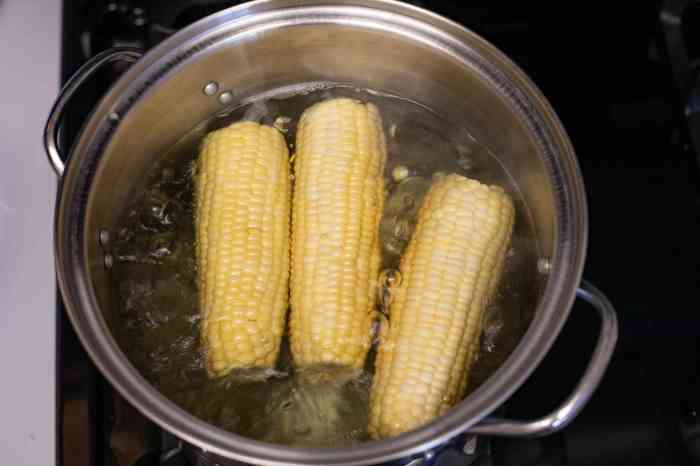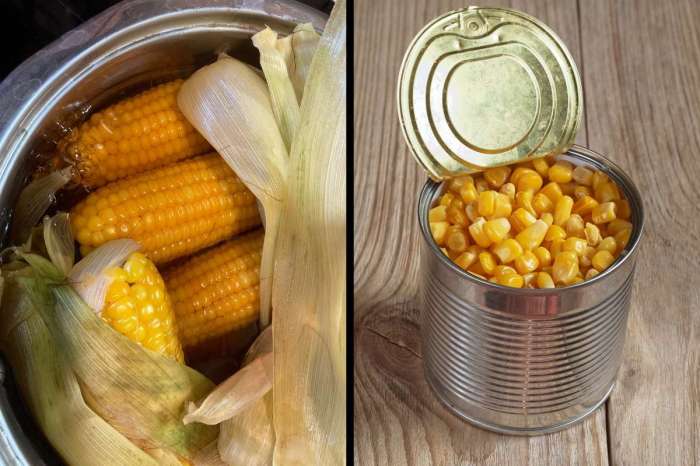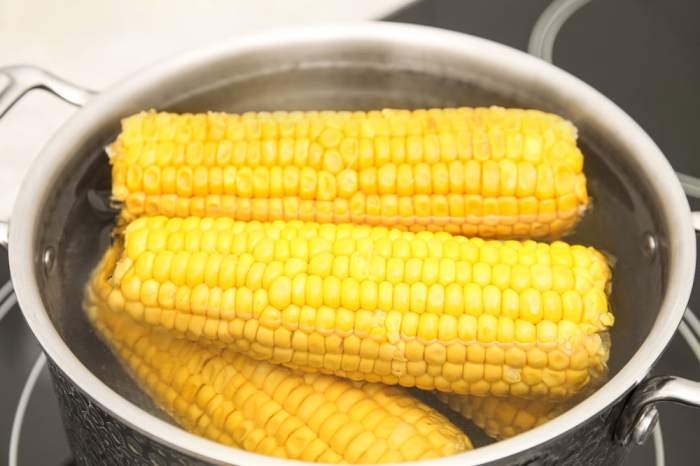Is Water from Boiling Corn Good for Plants?
Nutritional Content of Corn Water

Source: simplyrecipes.com
Is water from boiling corn good for plants – Corn water, the liquid leftover from boiling corn, contains a surprising array of nutrients beneficial to plants. Understanding its composition allows us to assess its potential as a plant fertilizer.
Nutrient Composition of Corn Water
Corn water is rich in various minerals and organic compounds leached from the corn during boiling. These include potassium, phosphorus, nitrogen, and various trace elements vital for plant growth. The exact composition varies depending on the type of corn, the boiling time, and the water volume used. Organic compounds like sugars and amino acids also contribute to the nutritional value.
Comparison to Other Plant Fertilizers
Compared to commercially available fertilizers, corn water offers a more natural and readily available source of nutrients. However, its nutrient concentration is generally lower than that of synthetic fertilizers. For example, while corn water provides potassium, a synthetic fertilizer may offer a much higher concentration of potassium, alongside precisely controlled levels of nitrogen and phosphorus. This makes it essential to understand the limitations and appropriate application methods.
Benefits and Drawbacks of Using Corn Water, Is water from boiling corn good for plants
| Nutrient | Corn Water Concentration (Estimate) | Commercial Fertilizer Concentration (Example) | Benefits | Drawbacks |
|---|---|---|---|---|
| Potassium (K) | Low | High | Supports healthy root growth | May not provide sufficient potassium for heavy feeders |
| Phosphorus (P) | Low to Moderate | High | Essential for flowering and fruiting | Concentration may be insufficient for optimal yield |
| Nitrogen (N) | Low to Moderate | High | Promotes leaf growth | May not provide sufficient nitrogen for vigorous growth |
| Sugars & Amino Acids | Moderate | None | Provides readily available energy and building blocks for plants | May attract pests if not used properly |
Effects of Corn Water on Plant Growth
The impact of corn water on plant growth is influenced by several factors, including the plant species, the concentration of corn water used, and the frequency of application. While not a replacement for complete fertilization, it can offer supplementary nutrients.
Impact on Plant Growth Rate
Studies on the effect of corn water on plant growth are limited. However, anecdotal evidence and small-scale experiments suggest that corn water can positively influence the growth rate of certain plants, particularly those with lower nutrient requirements. For example, some gardeners report improved growth in leafy greens and herbs when watered with diluted corn water.
Experiments and Studies
While large-scale, controlled studies are lacking, many gardeners have observed positive results. These observations suggest that corn water may act as a supplemental nutrient source, providing readily available nutrients and organic matter that benefit plant growth. Further research is needed to quantify these effects across various plant species and soil types.
Potential Toxicity from Excess Application
Excessive use of corn water can lead to issues like nutrient imbalances and the potential for attracting pests due to the sugars present. Therefore, dilution is crucial. The build-up of salts in the soil from repeated applications could also hinder plant growth.
Positive and Negative Effects on Plant Health
- Positive Effects: Improved nutrient uptake, enhanced root development, increased vigor in some plants, readily available energy source.
- Negative Effects: Potential for nutrient imbalances, pest attraction, risk of fungal growth if not properly diluted and managed, salt buildup in soil with excessive use.
Comparison to Other Watering Methods
Watering plants with corn water offers a unique approach compared to using plain water or commercial fertilizers. A direct comparison reveals distinct advantages and disadvantages.
Effectiveness of Corn Water vs. Plain Water

Source: flourishingplants.com
Compared to plain water, corn water provides additional nutrients, potentially leading to better plant growth and yield. However, the extent of this improvement depends on the plant species and the overall nutritional needs of the plant.
Boiling corn releases nutrients into the water, potentially benefiting plants. However, the suitability depends on the water’s mineral content; you should consider whether is hard water bad for plants , as hard water’s high mineral concentration can sometimes hinder plant growth. Therefore, while corn water offers some advantages, understanding your water’s properties is key to healthy plant care.
Observations on Plant Growth, Health, and Yield
Anecdotal evidence suggests that plants watered with diluted corn water exhibit improved leaf color, slightly increased growth rate, and possibly higher yields in some cases. However, these observations need rigorous scientific validation. Further research is necessary to establish concrete conclusions.
Long-Term Effects on Soil Health
The long-term effects of using corn water on soil health are not fully understood. While the organic matter in corn water may improve soil structure, potential negative effects from excessive use, such as salt buildup, need further investigation.
Comparative Study Methodology
A comparative study could involve setting up multiple groups of plants, each watered with different solutions: plain water, diluted corn water, and a commercial fertilizer solution. Growth parameters, yield, and soil analysis would be monitored over time to assess the impact of each treatment.
Practical Application and Considerations
Using corn water effectively requires careful planning and execution. Appropriate techniques ensure optimal results and minimize potential risks.
Collecting and Storing Corn Water
- Collect the water used to boil corn.
- Allow it to cool completely.
- Store it in a clean container in the refrigerator for up to a week.
Challenges in Using Corn Water for Irrigation
Challenges include inconsistent nutrient content, the potential for pest attraction, and the need for appropriate dilution to avoid nutrient imbalances or salt buildup.
Dilution Ratios for Various Plant Types
A general guideline is to dilute corn water at a ratio of 1:10 (one part corn water to ten parts plain water). However, this ratio may need adjustment based on the plant species and its nutrient requirements. Experimentation and observation are key to finding the optimal dilution for specific plants.
Safe and Effective Irrigation Techniques
Apply diluted corn water directly to the soil, avoiding contact with the plant leaves to prevent fungal growth. Avoid overwatering, and monitor plant health closely.
Potential Risks and Limitations: Is Water From Boiling Corn Good For Plants

Source: cleangreensimple.com
While corn water offers potential benefits, understanding its limitations and associated risks is crucial for safe and effective application.
Potential Risks
- Pest attraction due to sugars.
- Fungal growth if not properly diluted and applied.
- Nutrient imbalances if not managed correctly.
- Salt buildup in soil with excessive use.
Limitations of Corn Water as a Primary Nutrient Source
Corn water should not be considered a complete fertilizer. It lacks the balanced and concentrated nutrients found in commercial fertilizers. It is best used as a supplemental nutrient source.
Mitigating Risks and Addressing Limitations
Dilute the corn water appropriately, avoid overwatering, monitor plants for signs of nutrient deficiency or pest infestation, and consider supplementing with other fertilizers if necessary.
Precautions to Take When Using Corn Water
- Always dilute corn water before use.
- Avoid overwatering.
- Monitor plants for any adverse effects.
- Supplement with other fertilizers as needed.
Visual Representation of Corn Water’s Impact
Image: Healthy Plants Watered with Corn Water vs. Plain Water
A comparative image would show two groups of plants of the same species and age. The plants watered with diluted corn water would exhibit a deeper green leaf color, larger and more numerous leaves, and a generally more vigorous appearance compared to the plants watered with plain water. The latter might appear slightly paler, with smaller leaves and less robust growth.
Image: Microscopic Structure of Soil Treated with Corn Water
A microscopic image of soil treated with diluted corn water would reveal a richer soil structure, with potentially more visible organic matter and improved aggregation of soil particles compared to untreated soil. The untreated soil might appear more compacted and less rich in organic matter.
Key Questions Answered
Can I use corn water on all types of plants?
While generally safe, the suitability of corn water varies by plant. Start with diluted solutions and monitor plant response for any adverse effects.
How long can I store corn water before using it?
Store corn water in a sealed container in the refrigerator for up to 3 days to prevent bacterial growth.
Does corn water attract pests?
Potentially. The sugars in corn water might attract some insects. Diluting the water and ensuring good air circulation can help mitigate this.
What if my plants show signs of distress after using corn water?
Immediately cease use and flush the soil with plain water. The problem could be due to over-fertilization or a specific plant sensitivity.




















